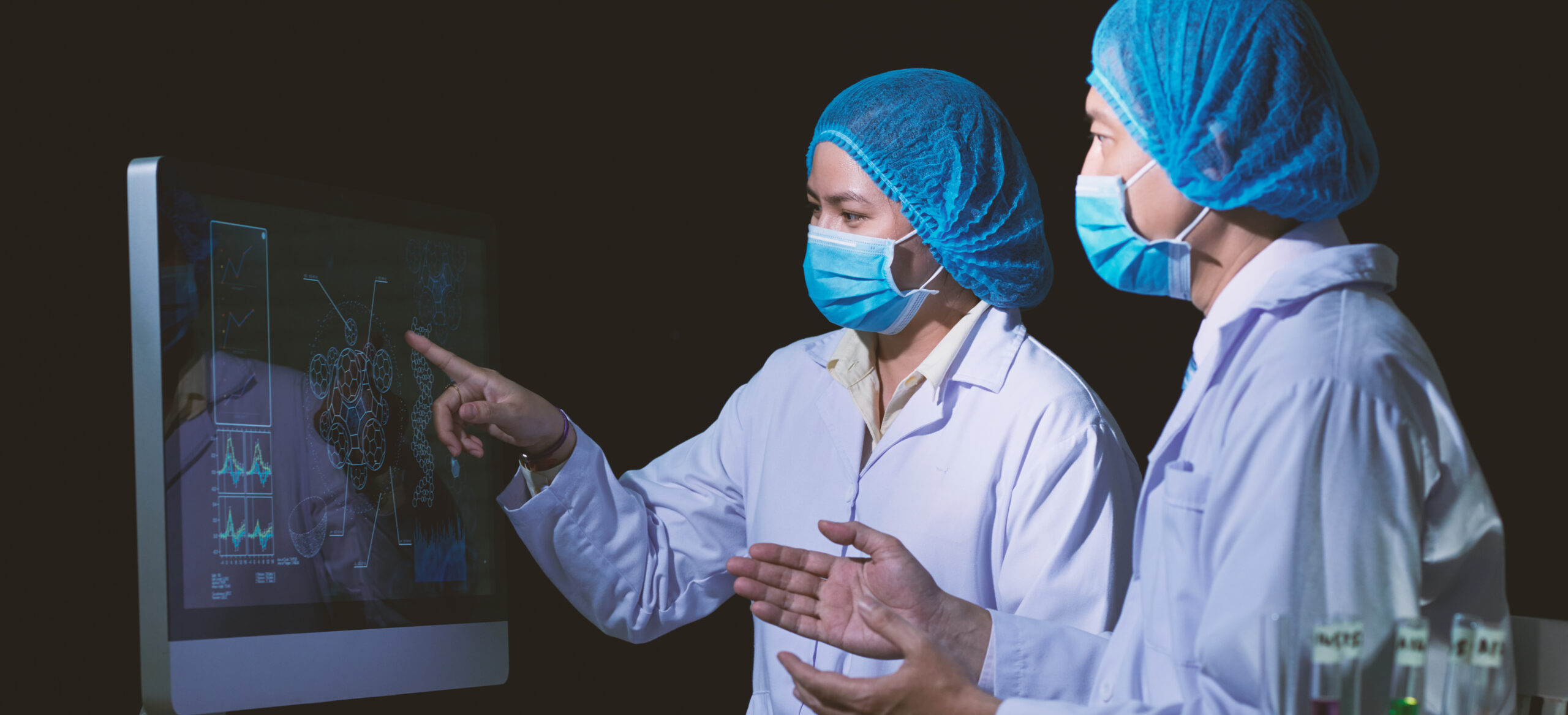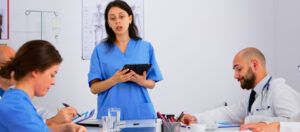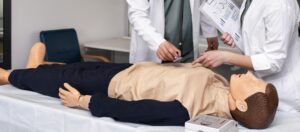Behind every successful diagnosis, surgical procedure, or critical intervention, there are trained professionals working with precision and purpose. These individuals are not always doctors or nurses. They belong to a growing, vital domain known as allied health sciences.
Allied health sciences deal with more than just supportive primary care. Accounting for different facets like operating advanced diagnostic machines to stabilising trauma patients in golden-hour scenarios, allied health professionals bring expertise that keeps hospital systems running day and night.
With more specialty hospitals (trauma centres, Gastroenterology Hospitals, etc), emerging in the Indian healthcare setup, digital diagnostics and emergency care protocols are getting adopted across both urban and rural sectors. And the subsequent need for trained allied health staff has thus risen at a rapid pace. Yet, for many science students, this career path is still lesser known or misunderstood.
If you have ever been curious about healthcare beyond MBBS, this is where your attention is needed. Read this blog to explore the top allied health science courses available in India. You will learn about eligibility, duration, training modules, and career possibilities.
What is an Allied Health Science course?
Allied health science is the framework that equips such professionals with the clinical, technical, and critical skills needed to function in diverse healthcare environments.
Just think about it. A hospital without radiographers, physiotherapists, operating theatre technicians, or lab technologists. You just imagined a disastrous situation!
Allied health science courses are specialised academic programs designed to train students in patient care support, diagnostic procedures, therapeutic services, and emergency response techniques. These are not simply support roles. They are frontline careers in modern medicine that demand sharp reflexes, empathy, scientific understanding, and operational discipline.
The curriculum is often multidisciplinary. It draws from fields like human anatomy, microbiology, medical equipment handling, patient assessment, and post-operative support. Practical application is at the heart of these courses, with real-time hospital exposure, simulation training, and hands-on lab work forming a significant part of the syllabus.
Need a detailed outlook from the brand itself? A formal Introduction to Allied Health Programs from Red Versity is worth exploring!
Skills Needed for a Successful Career in Allied Health
There is no single blueprint for success in this field, but there are recurring qualities that shape reliable allied health professionals.
As a person of the cloth, you will be stepping into situations where lives are vulnerable and human dignity must be preserved. These careers ask for people who are not only trained but also mentally and emotionally prepared to respond in high-pressure environments. The skill set required goes far beyond classroom knowledge.
1. Clinical and Technical Aptitude
Healthcare relies heavily on precision. Allied health professionals often work directly with sensitive medical equipment or perform diagnostic procedures that guide critical treatment decisions. This includes operating:
- MRI and CT scanners
- Ultrasound and X-ray systems
- Ventilators, defibrillators, and patient monitors
- Anaesthesia and surgical assistance tools
A student must understand how these machines function, how to calibrate them before each use, and how to troubleshoot mid-procedure without panicking. Additionally, many roles now demand familiarity with hospital information systems, electronic health records, and basic medical coding.
2. Emotional Intelligence and Communication
In medical care, equipment supports the process, but people carry the experience. An allied health professional is often the person standing beside a child getting their first X-ray or helping a senior citizen navigate dialysis. The ability to speak with empathy, listen without judgment, and communicate medical steps in simple language is crucial.
Here is what effective communication looks like in practice:
- Explaining a diagnostic scan to a worried parent
- Guiding a patient through breathing exercises during a panic attack
- Informing the attending physician about subtle changes in a trauma victim’s vitals
- Supporting a fellow team member during a code blue emergency
3. Critical Thinking in Fast-paced Environments
From emergency rooms to neonatal intensive care units, healthcare systems run on urgency. Every second matters. That is why allied health students are trained to make rapid yet rational decisions. Whether it is calculating the correct IV fluid level, interpreting a sudden drop in oxygen saturation, or responding to cardiac arrhythmias, there is little room for hesitation.
The ability to notice small but significant changes in a patient’s behaviour or medical readout can prevent complications before they escalate. In this sense, attention to detail is not optional. It is the difference between reacting and rescuing.
4. Adaptability and Team Coordination
Hospitals are dynamic environments. One day you may be stationed in a radiology unit, the next in an emergency operating room. You must adapt quickly to changing roles, updated protocols, and unpredictable patient needs. Allied health professionals also work in tight coordination with doctors, nurses, ambulance teams, and even administrative staff. Teamwork is not just encouraged; it is essential.
Some scenarios demand immediate synchronisation:
- Assisting during organ transplant transports
- Managing multiple trauma patients after a road accident
- Switching roles during disaster relief operations
Your ability to stay organised and work as part of a fluid team ensures smoother outcomes and fewer delays.
5. Certifications and Continued Learning
A diploma or degree is the beginning, not the end. Most high-performing allied health professionals invest in additional certifications, such as:
- AHA-accredited courses (First Aid, ITLS, PALS, CPR, BLS, ACLS and more.)
- Infection Control and Biomedical Waste Management
- Emergency Medical Responder (EMR)
- Specialised imaging or lab software handling
Internships in multi-specialty hospitals, private clinics, or even mobile medical units can add real-time exposure and confidence. These training programs often simulate real-world scenarios where one learns to prioritise, multitask, and apply protocol under time pressure.
6. Physical and Mental Endurance
The work can be physically demanding. Standing for long hours in an operating theatre, assisting with patient transfers, or responding during critical shifts at odd hours are all part of the routine. But mental stamina matters just as much. Witnessing pain, loss, or long recovery periods can affect one emotionally. The ability to stay grounded, seek supervision when needed, and take time to reflect helps avoid burnout.
To equip yourself with the best skill sets, explore top-ranked allied health diplomas & degrees to learn from a trusted source and get some clarity on future possibilities.
Who should pursue allied health sciences?
If you are a student who enjoys biology but does not feel called to pursue MBBS, allied health sciences offer a rewarding and equally respected alternative. It is a field for those who want to be clinically involved, but through precision-based roles that require less time investment than traditional medical degrees.
You might be a great fit for this field if you:
- Prefer action-oriented work over theory-heavy routines
- Are able to stay calm in critical or emotionally intense situations
- Value teamwork, discipline, and the satisfaction of helping patients directly
- Want a stable healthcare career with relatively shorter study durations
Most allied health science courses require a 10+2 qualification in science (PCB). Some institutions allow lateral entry for paramedical diploma holders. The academic expectations are moderate, but the practical demands are high. This is why commitment and presence of mind are more important than top board scores.
This is also an excellent choice for those who want career flexibility. From hospitals and trauma centres to sports medicine clinics, diagnostic labs, and international healthcare settings, your skillset can travel across roles, sectors, and even countries.
List of Top Allied Health Science Courses
BMLT – Bachelor of Medical Laboratory Technology
Duration: 3 years (plus 6 months internship)
Eligibility: Passed Class 12 with Physics, Chemistry, and Biology as compulsory subjects
Career Path: Medical labs, pathology departments, diagnostics chains
This course prepares you to perform complex lab analyses for blood, urine, tissue, and other biological samples. Lab technologists form the backbone of diagnosis, working behind the scenes to detect infections, chronic conditions, and abnormalities. With the rise of preventive healthcare and advanced diagnostics, the demand for this role is only growing.
BSc Nursing
Duration: 4 years
Eligibility: Completed Class 12 with Physics, Chemistry, and Biology. English should be one of the core subjects. Most institutes require at least 45 to 50 percent aggregate marks.
Career Path: Hospitals, community health, intensive care, international placements
Nursing is one of the most versatile allied health careers. Nurses are trained in clinical care, post-operative recovery, patient communication, and often handle emergency triage and chronic care. India’s nursing workforce is highly respected worldwide, offering both national stability and overseas opportunities.
BSc Medical Imaging Technology
Duration: 3 years
Eligibility: 10+2 Science (with Physics and Biology)
Career Path: Radiology departments, CT/MRI centres, diagnostic chains
Imaging technologists assist in conducting and interpreting scans like X-rays, MRIs, and ultrasounds. Their accuracy directly impacts diagnosis and treatment plans. Students are taught radiation safety, image processing, and real-time equipment usage.
BSc Optometry
Duration: 4 years (including clinical training)
Eligibility: Passed Class 12 with Physics, Chemistry, Biology, or Mathematics. A minimum of 50 percent aggregate is usually required.
Career Path: Eye hospitals, optical clinics, vision therapy centres
Optometrists are eye care professionals who screen, detect, and correct visual disorders. They play a key role in reducing avoidable blindness in India, especially in semi-urban and rural areas where ophthalmologists are not always available.
BSc and MSc in Operating Theatre and Anaesthesia Technology
Duration: 3 years + 2 years
Eligibility: For undergraduate, passed Class 12 with Physics, Chemistry, and Biology. For postgraduate studies, a BSc in the same or related stream is required.
Career Path: OT departments, surgical suites, trauma centres
Trained professionals assist in surgeries by preparing sterile environments, managing anaesthesia procedures, and monitoring patient vitals. They are vital to emergency and elective surgeries.
BSc Trauma Care
Duration: 3 years
Eligibility: Passed Class 12 with Physics, Chemistry, and Biology from a recognised board
Career Path: Emergency rooms, ambulance services, trauma centres
This course trains students to handle accident injuries, fractures, burns, and other trauma-related emergencies. With more road accidents and disaster responses, trauma specialists are in high demand.
BSc and MSc in Emergency Medicine and Critical Care
Duration: 3 to 5 years (UG and PG)
Eligibility: For undergraduate, completion of Class 12 with Physics, Chemistry, and Biology. For postgraduate studies, a relevant allied health or medical degree is necessary.
Career Path: Emergency departments, ICUs, rapid response teams
Students learn to assess and stabilise critical patients, assist in ventilator care, and respond to cardiac arrests and shock. This is a fast-paced and mentally challenging field.
BSc and MSc in Cardiovascular Technology
Duration: 3 to 5 years
Eligibility: Passed Class 12 with core subjects including Physics, Chemistry, and Biology. A minimum of 50 percent aggregate may be required by most institutes
Career Path: Cath labs, cardiology clinics, surgical support
These professionals support cardiac surgeons and interventionists by managing diagnostic equipment like ECG, ECHO, and stress tests. They assist in stent placements and angioplasties.
Physiotherapy
Duration: 4.5 years
Eligibility: Passed Class 12 with Physics, Chemistry, and Biology. Some institutes require English as a core subject and at least a 50 percent aggregate.
Career Path: Rehabilitation centres, sports clinics, hospitals.
Physiotherapists help patients recover from injuries, surgeries, and neurological conditions through physical therapy and movement-based interventions.
BSc in Renal Dialysis Technology
Duration: 3 years
Eligibility: Passed Class 12 with a Science background, including Physics, Chemistry, and Biology. Some universities may require a minimum of 45 percent aggregate marks.
Career Path: Dialysis units, nephrology clinics, private care
This program focuses on the operation and maintenance of dialysis machines for patients with kidney failure. Students learn about fluid balance, infection control, and post-dialysis care.
Diploma/BSc in Paramedical Science
Duration: 2 to 3 years (Diploma) / 3 years (BSc)
Eligibility: Passed Class 12 with Physics, Chemistry, and Biology from a recognised board
Career Path: Ambulance services, emergency departments, disaster response units
Paramedics are trained to provide pre-hospital emergency care, stabilising patients during transport and supporting doctors in critical interventions. They are often the first responders in medical emergencies, making this a vital profession in India’s healthcare system.
These sets of degrees will impart the key Skills for allied health careers , using their well-planned curriculum.
Career Opportunities After Allied Health Courses
Allied Health Science is a dynamic ecosystem that balances human compassion with medical precision. Graduates step into roles that touch lives directly, evolve with technology, and offer stability in strenuous scenarios.
Clinical and Diagnostic Careers
Graduates can find direct patient care or diagnostic roles in:
- Hospitals and Multi-specialty Clinics: Roles in radiology, anesthesiology assistance, cardiac care, dialysis, emergency support, and more.
- Diagnostic Laboratories: Positions in pathology, medical lab technology, and imaging, such as X-ray, MRI, and CT scan operations.
- Rehabilitation Centers: Opportunities for physiotherapists, occupational therapists, and speech therapists.
Freelance and Homecare Opportunities
Professionals in optometry, physiotherapy, speech therapy, and occupational therapy can now pursue:
- Private home visits and mobile clinics
- Freelance consulting via telehealth platforms
- Part-time contracts with wellness and rehab centres
This flexibility allows for independent practice or supplemental income streams alongside primary jobs.
Global Employment Scope
Indian allied health graduates are actively recruited in:
- Gulf countries, Canada, the UK, and Australia, often with required licensing or certification exams
- Cruise ships, defense healthcare units, and international NGOs
- Medical tourism facilities catering to foreign patients in India and abroad
Certifications aligned with global standards enhance mobility and job prospects across borders.
Earning Potential
Entry-level salaries range between ₹15,000 to ₹60,000 per month in India.
With experience and specialization, professionals can move into roles offering ₹80,000 and beyond, especially in metro cities and corporate hospitals.
International placements offer competitive packages with additional benefits like relocation support and insurance coverage.
Why choose the Redversity allied health science course in India?
Redversity combines academic depth with industry-readiness, helping students step confidently into global healthcare careers. Here’s what sets us apart:
What You Get at Redversity:
- 100% Job Placement Guarantee with top hospitals and clinics
- Hands-on Training using the latest healthcare technologies
- Global Certifications are recognized across countries
- Expert Faculty from reputed medical institutions
- University Collaborations with national and international partners
- Career-Focused Programs, including PGCM in Prehospital Care
- Simulation-Based Learning for real-world readiness
- Entrepreneurship Support for Aspiring Healthcare Innovators
Redversity doesn’t just educate, it transforms futures in allied healthcare.
FAQ’s
Contact Us
Curious about where a future in allied health can take you? Let’s talk possibilities, programs, and your next steps.
Drop In: Find us at 6B iLabs, Madhapur, Hyderabad, 500081. Walk in with questions, walk out with clarity.
Give Us a Ring: Dial +91 90800 96302 and connect directly with our admissions team.
Write to Us: Send your queries to admissions@redversity.com. We reply faster than you expect.
Your future in healthcare starts with a conversation. Reach out now and let’s get you career-ready.




